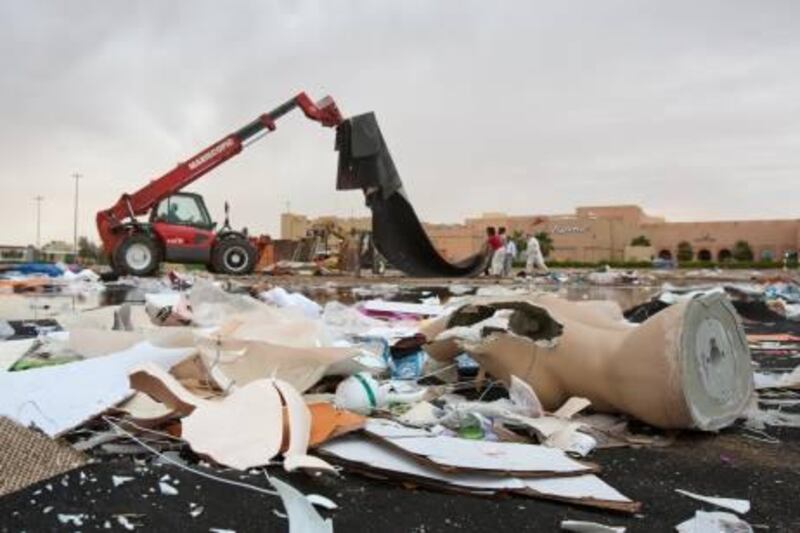AL AIN // Al Ain Municipality is drawing up new rules for tent operators after a souq collapse this month.
Almost 50 people ended up at Al Ain and Tawam Hospital's casualty wards on April 10 after a tent blew over with more than 1,000 people inside. Three women, one of them eight months pregnant, remain at Al Ain hospital after being trampled in the rush to get to safety.
The municipality has yet to publish the results of its investigation, which will rule on whether the collapse was the result of bad luck or the tent not being adequately secured to the ground, as was claimed by Osama Burhan, the event's organiser.
The municipality yesterday said it planned to hold "extensive" meetings with tent operators - including Al Khaleej tents, which owned the one that collapsed - to explain the draft rules.
Tents would be required to have a metal structure that complies with as yet unspecified standards, and would be allowed to stay up for only a limited time.
Each company would also have to appoint a specialist who must ensure that approved technical regulations are met and the tent is safe.
If faults are found, this person would then be questioned.
Municipal officials would also inspect tents once they are erected, and regularly thereafter.
Until the regulations are official, only essential tents will be allowed.
Tent safety has been a concern for authorities since 41 people died in a fire at a Kuwaiti wedding in 2009.
Last year, before Ramadan, civil defence authorities in several emirates said they would inspect tents and check for fire extinguishers and adequate exits.
Those inspectors, however, do not check the integrity of the overall structure.
For many Emiratis, the tent collapse in Al Ain was the last straw.
Maryam Mohammed, a 23-year-old from Al Ain, said that even though no one died in the collapse, the incident was proof that tents are unsafe.
"Why should I put my life at risk?" she asked. "There are 1,000 other places to go. Tents are unsafe and stuffy - even with regulations, they are still tents."
Mohammed al Hajri, 40, from Buraimi, was inside the souq with his pregnant wife, Fatima, on the night of the collapse. She is one of the three still in hospital, having broken eight bones in her back and shoulder. Mr al Hajri said he would not even think about going inside a tent again.
"It is impossible for both of us, even if it is all metal - the tent was already all metal," he said.
"Like the Kuwaiti incident, if there is a fire, it would be a catastrophe even with regulations. It is not cement, it is fabric."
He said police officers at Al Jimi police station told him yesterday that the case was being investigated by prosecutors and would be referred to court if there were any charges.





